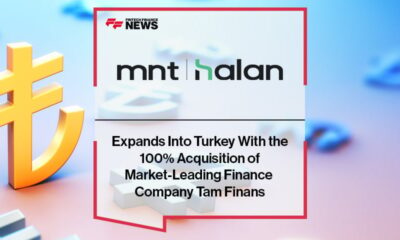Fintech
Egypt’s MNT-Halan Cashes in $157.5M, Absorbs Turkish Fintech to Expand

MNT-Halanan Egyptian fintech unicorn, is on the road to consolidation. The microfinance and payments startup has raised $157.5 million in funding and is using the money in part to fund its acquisition of another fintech, Tam Finans, to expand into Turkey.
Tam Finans provides financing to micro and SMEs. It currently operates 39 branches in 26 cities across Turkey and claims to have a 40% market share in the country. The combined entity resulting from this deal will have a loan portfolio of “just under $1 billion,” according to MNT-Halan’s CEO, Mounir Nakhla.
The exact financial terms of the deal were not disclosed, but one component of the deal involved shares: Actera, one of Turkey’s largest private equity firms, and the London-based European Bank for Reconstruction and Development (EBRD) jointly own Tam Finans MNT-Halan and both will become shareholders of MNT-Halan.
This latest funding comes about 19 months after MNT-Halan raised 400 million dollars in stock and debt, which brought the company to a value of $1 billion after one of the financiers, Chimera Investments, acquired a 20% stake for $200 million.
MNT-Halan is not disclosing its exact valuation with this latest round, other than to note that it is now over $1 billion. Tam Finans has raised over $30 million since its founding, mostly through debt, according to PitchBook.
Nakhla, who co-founded the company with the CTO by Ahmed Mohsen — said in an interview with TechCrunch that his company began discussions with Tam Finans about 18 months ago. The Egyptian fintech saw it as a counterpart to expand its existing business, “a great entry into the Turkish market.”
“Turkey is a country just two hours away from Egypt with a GDP of around $1 trillion and a large population,” he added. “We see a huge opportunity to capitalize on the various products we have created in Egypt.” That includes, he said, its core banking product Neuron; its backend system; and its app development and other services. “We intend to leverage Tam Finans’ scale, distribution networks, management experience and financial power to have a strong foothold and significant presence in Turkey.”
In addition to upselling existing customers, there are also opportunities to bring in completely new ones. Over 30% of the Turkish population remains unbanked, and this has presented an opportunity for many aspiring fintechs. Since the economic crisis of 2018, several fintechs such as Tam Finans have emerged to offer financing to the unbanked segments in Turkey, operating in the areas of credit scoring, credit consolidation and alternative lending.
Tam Finans specializes in “invoice factoring,” a form of alternative financing aimed at micro, small and medium-sized enterprises (MSMEs), where Tam Finans buys companies’ outstanding invoices in exchange for cash up front. The company has developed a credit scoring system that allows it to digitally approve and disburse loans to over 20,000 active businesses. In total, it has a loan portfolio of about $300 million.
MNT-Halan itself recently obtained a factoring license and plans to launch into this sector in the fourth quarter of 2024 to complement its existing business of lending to small and microenterprises.
To date, MNT-Halan says it has issued more than $4.5 billion in loans and served more than 7 million customers in Egypt (5 million financial customers and 3 million borrowers), up from $2 billion in loans to 5 million customers in January. At the time, MNT-Halan, which bills itself as Egypt’s largest lender to the unbanked, said businesses accessed loans worth $1,000 on average, paying 25% annual interest.
Lending is the core business and main revenue generator of MNT-Halan, but it also offers a range of other products, including consumer finance, prepaid cards, e-wallets, savings, payments, e-commerce, delivery of consumer goods (via a acquisition) and payments via mobile POS, all elements that flow into a larger lending operation.
In April, it launched a super app to bring all these services under one roof. Nakhla is very excited about the growth of the prepaid card product, which accesses consumer financing limits on the app and allows users to make purchases with flexible payment options.
“Nubank is an inspiration,” he said. “We have about 1.8 million app users on a quarterly basis, and the card is the next big thing.”
According to Nakhla, MNT-Halan says it has issued over 130,000 cards since its launch four months ago, and is currently issuing between 1,000 and 2,500 per day.
The fintech said it had more than $300 million in revenue in 2022, and while it is not disclosing more current numbers, revenue has grown 35% year-over-year since then, and it expects the same growth (in dollar terms this year) despite the sharp devaluation of the Egyptian pound. “Our forecast for 2024 is that the combined entities will reach between $500 million and $600 million in revenue,” Nakhla said.
MNT-Halan’s acquisition of Tam Finans follows its expansion into Pakistan in March, where it acquired a microfinance bank, and is “exploring other big moves,” according to Nakhla.
This growth investment raised from existing investors including DPI (Development Partners International), Lorax Capital Partners, funds managed by Apis Partners LLP, Lunate and GB Corp, will facilitate these moves. The investment also includes $40 million from IFC, a World Bank subsidiary money revealed that he was investing in the company last January. With this round, MNT-Halan has raised over $630 million in equity and debt.
Fintech
US Agencies Request Information on Bank-Fintech Dealings

Federal banking regulators have issued a statement reminding banks of the potential risks associated with third-party arrangements to provide bank deposit products and services.
The agencies support responsible innovation and banks that engage in these arrangements in a safe and fair manner and in compliance with applicable law. While these arrangements may offer benefits, supervisory experience has identified a number of safety and soundness, compliance, and consumer concerns with the management of these arrangements. The statement details potential risks and provides examples of effective risk management practices for these arrangements. Additionally, the statement reminds banks of existing legal requirements, guidance, and related resources and provides insights that the agencies have gained through their oversight. The statement does not establish new supervisory expectations.
Separately, the agencies requested additional information on a broad range of arrangements between banks and fintechs, including for deposit, payment, and lending products and services. The agencies are seeking input on the nature and implications of arrangements between banks and fintechs and effective risk management practices.
The agencies are considering whether to take additional steps to ensure that banks effectively manage the risks associated with these different types of arrangements.
SUBSCRIBE TO THE NEWSLETTER
And get exclusive articles on the stock markets
Fintech
What changes in financial regulation have impacted the development of financial technology?

Exploring the complex landscape of global financial regulation, we gather insights from leading fintech leaders, including CEOs and finance experts. From the game-changing impact of PSD2 to the significant role of GDPR in data security, explore the four key regulatory changes that have reshaped fintech development, answering the question: “What changes in financial regulation have impacted fintech development?”
- PSD2 revolutionizes access to financial technology
- GDPR Improves Fintech Data Privacy
- Regulatory Sandboxes Drive Fintech Innovation
- GDPR Impacts Fintech Data Security
PSD2 revolutionizes access to financial technology
When it comes to regulatory impact on fintech development, nothing comes close to PSD2. This EU regulation has created a new level playing field for market players of all sizes, from fintech startups to established banks. It has had a ripple effect on other markets around the world, inspiring similar regulatory frameworks and driving global innovation in fintech.
The Payment Services Directive (PSD2), the EU law in force since 2018, has revolutionized the fintech industry by requiring banks to provide third-party payment providers (TPPs) with access to payment services and customer account information via open APIs. This has democratized access to financial data, fostering the development of personalized financial instruments and seamless payment solutions. Advanced security measures such as Strong Customer Authentication (SCA) have increased consumer trust, pushing both fintech companies and traditional banks to innovate and collaborate more effectively, resulting in a dynamic and consumer-friendly financial ecosystem.
The impact of PSD2 has extended beyond the EU, inspiring similar regulations around the world. Countries such as the UK, Australia and Canada have launched their own open banking initiatives, spurred by the benefits seen in the EU. PSD2 has highlighted the benefits of open banking, also prompting US financial institutions and fintech companies to explore similar initiatives voluntarily.
This has led to a global wave of fintech innovation, with financial institutions and fintech companies offering more integrated, personalized and secure services. The EU’s leadership in open banking through PSD2 has set a global standard, promoting regulatory harmonization and fostering an interconnected and innovative global financial ecosystem.
Looking ahead, the EU’s PSD3 proposals and Financial Data Access (FIDA) regulations promise to further advance open banking. PSD3 aims to refine and build on PSD2, with a focus on improving transaction security, fraud prevention, and integration between banks and TPPs. FIDA will expand data sharing beyond payment accounts to include areas such as insurance and investments, paving the way for more comprehensive financial products and services.
These developments are set to further enhance connectivity, efficiency and innovation in financial services, cementing open banking as a key component of the global financial infrastructure.
General Manager, Technology and Product Consultant Fintech, Insurtech, Miquido
GDPR Improves Fintech Data Privacy
Privacy and data protection have been taken to another level by the General Data Protection Regulation (GDPR), forcing fintech companies to tighten their data management. In compliance with the GDPR, organizations must ensure that personal data is processed fairly, transparently, and securely.
This has led to increased innovation in fintech towards technologies such as encryption and anonymization for data protection. GDPR was described as a top priority in the data protection strategies of 92% of US-based companies surveyed by PwC.
Financial Expert, Sterlinx Global
Regulatory Sandboxes Drive Fintech Innovation
Since the UK’s Financial Conduct Authority (FCA) pioneered sandbox regulatory frameworks in 2016 to enable fintech startups to explore new products and services, similar frameworks have been introduced in other countries.
This has reduced the “crippling effect on innovation” caused by a “one size fits all” regulatory approach, which would also require machines to be built to complete regulatory compliance before any testing. Successful applications within sandboxes give regulators the confidence to move forward and address gaps in laws, regulations, or supervisory approaches. This has led to widespread adoption of new technologies and business models and helped channel private sector dynamism, while keeping consumers protected and imposing appropriate regulatory requirements.
Co-founder, UK Linkology
GDPR Impacts Fintech Data Security
A big change in financial regulations that has had a real impact on fintech is the 2018 EU General Data Protection Regulation (GDPR). I have seen how GDPR has pushed us to focus more on user privacy and data security.
GDPR means we have to handle personal data much more carefully. At Leverage, we have had to step up our game to meet these new rules. We have improved our data encryption and started doing regular security audits. It was a little tricky at first, but it has made our systems much more secure.
For example, we’ve added features that give users more control over their data, like simple consent tools and clear privacy notices. These changes have helped us comply with GDPR and made our customers feel more confident in how we handle their information.
I believe that GDPR has made fintech companies, including us at Leverage, more transparent and secure. It has helped build trust with our users, showing them that we take data protection seriously.
CEO & Co-Founder, Leverage Planning
Related Articles
Fintech
M2P Fintech About to Raise $80M

Application Programming Interface (API) Infrastructure Platform M2P Financial Technology has reached the final round to raise $80 million, at a valuation of $900 million.
Specifically, M2P Fintech, formerly known as Yap, is closing a new funding round involving new and existing investors, according to entrackr.com. The India-based company, which last raised funding two and a half years ago, previously secured $56 million in a round led by Insight Partners, earning a post-money valuation of $650 million.
A source indicated that M2P Fintech is ready to raise $80 million in this new funding round, led by a new investor. Existing backers, including Insight Partners, are also expected to participate. The new funding is expected to go toward enhancing the company’s technology infrastructure and driving growth in domestic and international markets.
What does M2P Fintech do?
M2P Fintech’s API platform enables businesses to provide branded financial services through partnerships with fintech companies while maintaining regulatory compliance. In addition to its operations in India, the company is active in Nepal, UAE, Australia, New Zealand, Philippines, Bahrain, Egypt, and many other countries.
Another source revealed that M2P Fintech’s valuation in this funding round is expected to be between USD 880 million and USD 900 million (post-money). The company has reportedly received a term sheet and the deal is expected to be publicly announced soon. The Tiger Global-backed company has acquired six companies to date, including Goals101, Syntizen, and BSG ITSOFT, to enhance its service offerings.
According to TheKredible, Beenext is the company’s largest shareholder with over 13% ownership, while the co-founders collectively own 34% of the company. Although M2P Fintech has yet to release its FY24 financials, it has reported a significant increase in operating revenue. However, this growth has also been accompanied by a substantial increase in losses.
Fintech
Scottish financial technology firm Aveni secures £11m to expand AI offering

By Gloria Methri
Today
- To come
- Aveni Assistance
- Aveni Detection
Artificial intelligence Financial Technology Aveni has announced one of the largest Series A investments in a Scottish company this year, amounting to £11 million. The investment is led by Puma Private Equity with participation from Par Equity, Lloyds Banking Group and Nationwide.
Aveni combines AI expertise with extensive financial services experience to create large language models (LLMs) and AI products designed specifically for the financial services industry. It is trusted by some of the UK’s leading financial services firms. It has seen significant business growth over the past two years through its conformity and productivity solutions, Aveni Detect and Aveni Assist.
This investment will enable Aveni to build on the success of its existing products, further consolidate its presence in the sector and introduce advanced technologies through FinLLM, a large-scale language model specifically for financial services.
FinLLM is being developed in partnership with new investors Lloyds Banking Group and Nationwide. It is a large, industry-aligned language model that aims to set the standard for transparent, responsible and ethical adoption of generative AI in UK financial services.
Following the investment, the team developing the FinLLM will be based at the Edinburgh Futures Institute, in a state-of-the-art facility.
Joseph Twigg, CEO of Aveniexplained, “The financial services industry doesn’t need AI models that can quote Shakespeare; it needs AI models that deliver transparency, trust, and most importantly, fairness. The way to achieve this is to develop small, highly tuned language models, trained on financial services data, and reviewed by financial services experts for specific financial services use cases. Generative AI is the most significant technological evolution of our generation, and we are in the early stages of adoption. This represents a significant opportunity for Aveni and our partners. The goal with FinLLM is to set a new standard for the controlled, responsible, and ethical adoption of generative AI, outperforming all other generic models in our select financial services use cases.”
Previous Article
Network International and Biz2X Sign Partnership for SME Financing
IBSi Daily News Analysis

SMBs Leverage Cloud to Gain Competitive Advantage, Study Shows
IBSi FinTech Magazine

- The Most Trusted FinTech Magazine Since 1991
- Digital monthly issue
- Over 60 pages of research, analysis, interviews, opinions and rankings
- Global coverage
subscribe now
-

 DeFi12 months ago
DeFi12 months agoDeFi Technologies Appoints Andrew Forson to Board of Directors
-

 Fintech12 months ago
Fintech12 months agoUS Agencies Request Information on Bank-Fintech Dealings
-

 News1 year ago
News1 year agoBlock Investors Need More to Assess Crypto Unit’s Earnings Potential, Analysts Say — TradingView News
-

 DeFi12 months ago
DeFi12 months agoSwitchboard Revolutionizes DeFi with New Oracle Aggregator
-

 DeFi12 months ago
DeFi12 months agoIs Zypto Wallet a Reliable Choice for DeFi Users?
-

 News1 year ago
News1 year agoBitcoin and Technology Correlation Collapses Due to Excess Supply
-

 Fintech12 months ago
Fintech12 months agoWhat changes in financial regulation have impacted the development of financial technology?
-

 Fintech12 months ago
Fintech12 months agoScottish financial technology firm Aveni secures £11m to expand AI offering
-

 Fintech12 months ago
Fintech12 months agoScottish financial technology firm Aveni raises £11m to develop custom AI model for financial services
-

 News1 year ago
News1 year agoValueZone launches new tools to maximize earnings during the ongoing crypto summer
-

 Videos5 months ago
Videos5 months ago“Artificial intelligence is bringing us to a future that we may not survive” – Sco to Whitney Webb’s Waorting!
-

 DeFi1 year ago
DeFi1 year agoTON Network Surpasses $200M TVL, Boosted by Open League and DeFi Growth ⋆ ZyCrypto


















